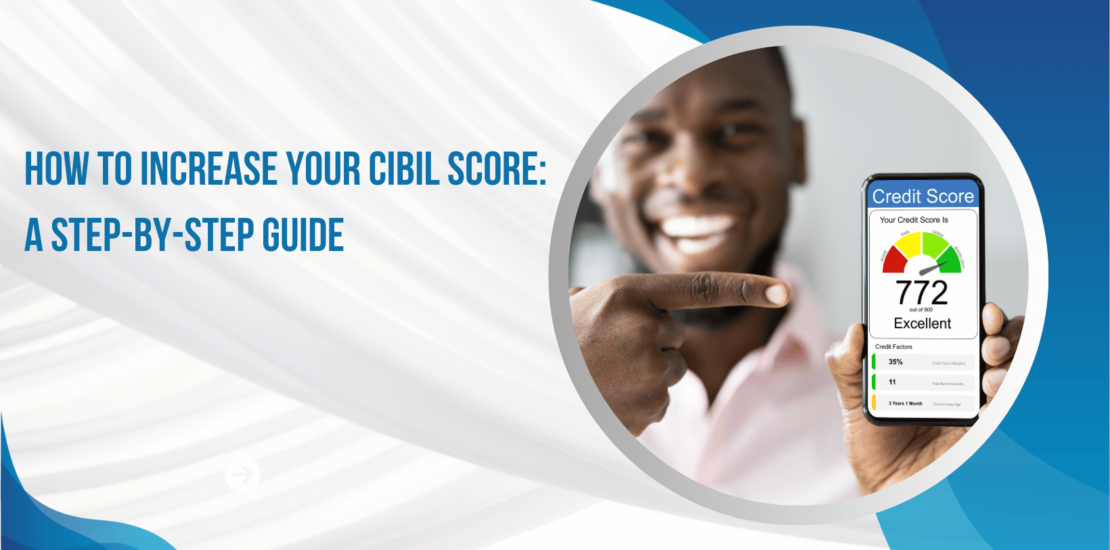How to Increase Your CIBIL Score: A Step-by-Step Guide
- August 18, 2024
- Posted by: harish.krishnamurthy82
- Category: Blog

Are you ready to take control of your financial future? Your CIBIL score is a critical factor in determining your creditworthiness, and improving it can open doors to better loan terms, lower interest rates, and financial freedom. But how do you navigate the path to a higher score?
Imagine this: With a few strategic steps and some insider knowledge, you could see your CIBIL score soar. This comprehensive guide will walk you through the essentials of increasing your CIBIL score, offering practical tips, expert advice, and actionable steps that can make a real difference. Ready to unlock the potential of your credit profile? Let’s dive in and explore how you can enhance your CIBIL score step by step!
Understanding Your CIBIL Score
What is a CIBIL Score?
A CIBIL score is a crucial three-digit number ranging from 300 to 900 that serves as a reflection of your creditworthiness. Generated by the Credit Information Bureau (India) Limited (CIBIL), this score is derived from your credit history and financial behavior. Understanding your CIBIL score is essential for making informed financial decisions and accessing credit opportunities. Here’s a snapshot of what each score range indicates:
- 300 to 549: Poor Credit Score
A score in this range signifies a high risk for lenders. If your score falls here, you may face significant challenges in obtaining secured loans or unsecured loans. Lenders view you as a high-risk borrower, which can lead to higher interest rates or outright rejections. - 550 to 649: Fair Credit Score
This range reflects a fair credit history. While you might still qualify for credit products, you could encounter difficulties securing personal loans or credit cards with favorable terms. It’s an indication that improvements are needed to boost your financial profile. - 650 to 749: Good Credit Score
A good score in this range suggests that you are a reliable borrower. You’re likely to be approved for credit products with reasonable terms. Lenders see you as a lower risk, making it easier to access loans and credit cards, provided you manage your credit card bills and avoid missed payments. - 750 to 900: Excellent Credit Score
An excellent score positions you as a low-risk borrower. With a score in this range, you can secure credit with favorable terms, including lower interest rates and better loan conditions. This is a testament to your strong credit management and financial reliability.
Tips to Improve Your CIBIL Score
- Set Reminders: The first thing you should do is set reminders to pay your bills on time. Timely payments help in maintaining a good history and reduce the chances of missed payments.
- Limit Hard Enquiries: Too many hard enquiries can decrease your score. Be selective about when you apply for new credit; this means avoiding multiple applications in a short period.
- Manage Existing Debt: If you’re dealing with too many loans, it’s advisable to pay down your existing debts to reduce your overall credit utilization. Consider consolidating debts to make payments easier.
- Monitor Your Credit Report: Regularly review your credit records to identify any inaccuracies or credit issues. If you find discrepancies, contact the relevant bank or financial institution to have them corrected.
- Educate Yourself: Understanding how credit works can help you make better decisions. For instance, knowing the implications of applying for unsecured loans versus secured loans can influence your borrowing strategy.
By following these strategies, borrowers can navigate the complexities of credit and take actionable steps towards improving their CIBIL score. Contact our service today to get personalized guidance from our experts and start your journey to better financial health!
Step-by-Step Guide to Increasing Your CIBIL Score
A strong CIBIL score is a cornerstone of financial health, influencing your ability to secure loans, credit cards, and favorable interest rates. If you’ve ever wondered how to enhance your creditworthiness and achieve a higher CIBIL score, you’re in the right place.
Imagine having access to the best financial products and enjoying the confidence that comes with a robust credit profile. This guide is designed to walk you through a comprehensive, step-by-step process to elevate your CIBIL score effectively. Whether you’re starting from scratch or looking to boost an already decent score, we’ll cover practical, actionable steps that can make a significant difference.
1. Review Your Credit Report
Why It Matters: Your credit report is a comprehensive record of your credit history and current status. Regular review helps you understand your credit standing, identify inaccuracies, and track your progress over time.
Detailed Steps:
- Obtain Your Credit Report: You can get a free copy of your credit report once a year from CIBIL. Additional reports can be purchased if needed. Ensure you review it from the official CIBIL website or authorized platforms.
- Examine the Report: Look through each section of your credit report, including personal details, credit accounts, payment history, and recent inquiries. Pay close attention to:
- Personal Information: Ensure your name, address, and other personal details are correct.
- Account Information: Verify that all accounts listed are yours and that the balances and statuses are accurate.
- Payment History: Check for any missed or late payments and ensure they are reported correctly.
- Dispute Errors: If you spot any inaccuracies, such as incorrect late payments or accounts you don’t recognize, file a dispute with CIBIL. You can usually do this online, and CIBIL will investigate and correct any verified errors.
2. Pay Your Bills on Time
Why It Matters: Timely payment is crucial for maintaining a positive credit score. Your payment history accounts for a significant portion of your CIBIL score, making it essential to stay current with your payments.
Detailed Steps:
- Set Up Payment Reminders: Use digital tools such as calendar alerts or smartphone apps to remind you of upcoming payment due dates. Many banks and financial institutions offer automated reminders.
- Automate Payments: Enroll in automatic payment plans where possible. Set up auto-pay for at least the minimum amount due to ensure payments are never missed.
- Create a Budget: Develop a detailed budget that tracks your income and expenses. Allocate funds specifically for debt repayments to avoid financial shortfalls.
3. Manage Your Credit Utilization Ratio
Why It Matters: Credit utilization reflects how much of your available credit you are using. A high credit utilization ratio can negatively impact your score as it suggests you might be over-relying on credit.
Detailed Steps:
- Monitor Credit Limits and Balances: Regularly review your credit card statements and online account dashboards to keep track of your credit utilization.
- Keep Balances Low: Aim to use less than 30% of your credit limit on each card. For instance, if your limit is ₹1,00,000, try to maintain a balance below ₹30,000.
- Request Credit Limit Increases: Contact your credit card issuer to request a higher credit limit. A higher limit can improve your utilization ratio if your spending remains the same.
4. Build a Long Credit History
Why It Matters: A longer credit history demonstrates to lenders that you have experience managing credit. This length of history contributes positively to your CIBIL score.
Detailed Steps:
- Avoid Closing Old Accounts: Keep older credit accounts open, even if you don’t use them frequently. The age of these accounts contributes to the length of your credit history.
- Use Old Accounts Responsibly: Regularly use your older accounts for small purchases and pay them off promptly to keep them active and in good standing.
5. Diversify Your Credit Types
Why It Matters: Having a mix of credit types, such as credit cards, installment loans, and mortgages, shows lenders that you can handle different types of credit responsibly.
Detailed Steps:
- Apply for Different Credit Types: If your credit profile consists mainly of credit cards, consider applying for a small personal loan or a different type of credit. Ensure that you can manage additional credit effectively.
- Manage New Credit Wisely: Use new types of credit responsibly. Avoid accumulating excessive debt, and make timely payments on all accounts.
6. Limit New Credit Applications
Why It Matters: Frequent credit inquiries can suggest financial instability and can lower your score. Each new application can result in a hard inquiry, which impacts your credit score.
Detailed Steps:
- Apply Only When Necessary: Avoid applying for new credit cards or loans unless absolutely needed. Each application can have a short-term negative impact on your score.
- Check Your Credit Report: Monitor your credit report for recent inquiries and ensure they are valid. Be cautious about applying for new credit unless you are confident of approval.
7. Address Outstanding Debts
Why It Matters: Unresolved debts, such as overdue accounts or accounts in collections, can significantly harm your credit score. Addressing these debts is crucial for improving your credit profile.
Detailed Steps:
- Pay Off Debts: Prioritize paying off outstanding debts, starting with those with the highest interest rates. Create a repayment plan to tackle these debts systematically.
- Negotiate Settlements: If you cannot pay off a debt in full, negotiate with creditors for a settlement or a more manageable repayment plan. Ensure any agreement is documented and adhered to.
8. Maintain a Balanced Credit Portfolio
Why It Matters: A balanced credit portfolio, including various types of credit accounts, reflects your ability to manage different credit forms responsibly.
Detailed Steps:
- Review Your Credit Accounts: Regularly check your credit accounts to ensure they are in good standing and that you are not over-leveraging yourself.
- Avoid Excessive Debt: Only take on new credit if you can manage it responsibly. Avoid overextending your credit by maintaining a manageable balance across accounts.
9. Use Credit Responsibly
Why It Matters: Responsible use of credit is crucial for maintaining and improving your score. This includes making payments on time, managing balances, and avoiding unnecessary debt.
Detailed Steps:
- Avoid Late Payments: Ensure all credit payments are made on time to maintain a positive payment history.
- Control Credit Card Usage: Use credit cards for essential purchases and pay off balances regularly to avoid accumulating high debt.
10. Seek Professional Advice
Why It Matters: If you encounter challenges in improving your score, professional advice can provide tailored strategies and expert guidance to enhance your credit profile.
Detailed Steps:
- Consult a Credit Counselor: Engage with a certified credit counselor who can offer personalized advice and create a plan to improve your credit score.
- Explore Financial Planning Services: Consider working with financial planning services to better manage your finances and develop strategies for credit improvement.
Conclusion
Increasing your CIBIL score involves a combination of strategic financial management and responsible credit behavior. By following the steps outlined in this guide—reviewing your credit report, paying bills on time, managing credit utilization, maintaining a healthy credit mix, monitoring your report regularly, avoiding negative behaviors, and seeking professional advice—you can improve your credit score and enjoy better financial opportunities.
Remember, improving your CIBIL score is a gradual process that requires patience and consistency. Implement these strategies, monitor your progress, and stay committed to good financial habits. With time and effort, you’ll see positive changes in your CIBIL score and achieve your financial goals.
